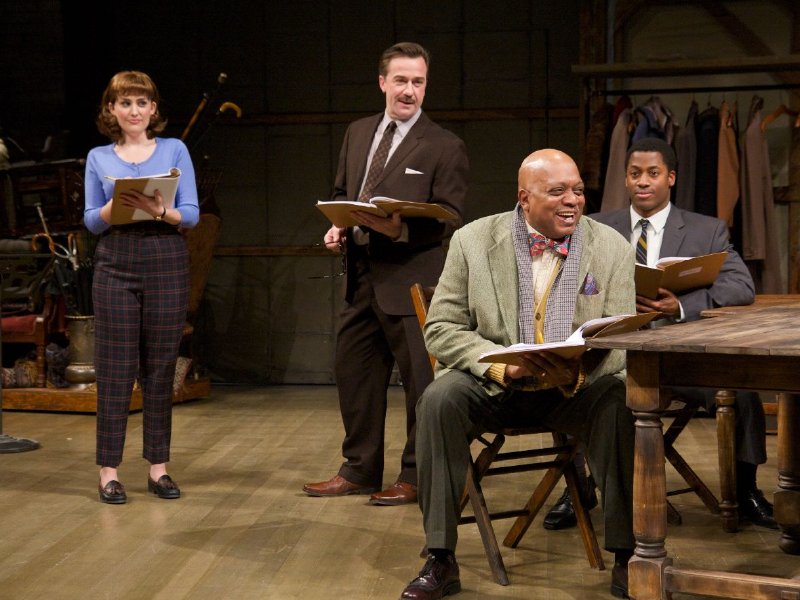When the American economy sneezes, the country's not-for-profit arts groups catch a cold. They are delicate and fragile creatures in survival-of-the-fittest capitalism.
The economy did a lot more than sneeze three years ago, and some theater companies across the country shrank or died. Wisconsin's stage groups benefited from being financially stable before the crash and having smart management. Quick on their feet, they made budget adjustments that cost jobs and stretched staffs thin but kept the organizations solvent with little change in the artistic product.
State theater patrons demonstrated their commitment to their favorite companies by standing by those groups to a greater extent than happened in other areas of the country.
As the calendar year comes to a close, I asked five top theater managers to assess the current economic condition of professional theater in the state. All saw a brightening fiscal picture and were optimistic, with reservations. Definite trends have emerged on both the box office and contributed income ends of the business.
Individual ticket sales are more volatile than in the past. Some shows do exceedingly well, and others fail to reach their goals.
"If people really want to see something, they go," Next Act Theatre managing director Charles Kakuk said. "It's when they are on the fence – they may have gone in the past, and may choose to not go now."
Julie Swenson, the producing director of Renaissance Theaterworks, agrees and has an interesting perspective on the change in customer behavior. "People buy tickets to specific plays they want to see rather than support specific companies.
"That makes programing all the more important, and it makes the play selection process crucial and time consuming. We have to find the right plays that interest the public."
There were some vivid examples of "right plays" this fall. Next Act's revival of "Sylvia" was a big hit, exceeding its optimistic goal. Kakuk said the company's first production of the comedy 15 years ago was a key box office success in the troupe's history, and the show continues to attract audiences.
On the other hand, Next Act's first show of the season, "The Exonerated," which inaugurated the group's new Fifth Ward theater, didn't meet its ticket sales goal.
The Skylight Opera Theatre's just closed "Music Man" has managing director Amy S. Jensen whistling "Seventy-Six Trombones" through the holidays. Virtually every performance sold out, smashing and surpassing the box office goal by $40,000.
"We could have easily extended it by three weeks," Jensen said. Scheduling conflicts and problems prevented that from happening.
Following the general pattern for local companies, the Skylight came up short of goal for its first offering of the season, "The Rivals."
Furthermore, "A Christmas Carol" has sold as well as planned, and the Rep's current mainstage show, "Next to Normal," is on track to meet its goal. The company's budget and staff size has returned to pre-recession levels, Helsing Wolters reports.
"The Rep still feels the impact of those difficult years, but these are different times for us," she said.
In Spring Green, similar optimism is voiced by American Players Theatre producing artistic director David Frank. His company saw a 7 percent increase in attendance and an 8.5 percent jump in earned income this year.
It is clear that future audience growth will rely on single ticket sales. Across the country, subscription sales began trending downward years before the economy tanked, and Wisconsin companies are fighting to simply maintain their present season ticket numbers.
The Rep's return to box office prosperity has been led by single tickets. Last season it sold 11,000 more than the previous year, and the company is 5,000 tickets ahead of that pace for 2011-12.
Other old methods of doing business may be waning. Renaissance's Swenson questions the value of advertising beyond direct mail postcards sent to previous customers.
"Word of mouth is our very best marketing tool. If a show has a good buzz, we will sell tickets," she said.
The Skylight's Jensen echoes that, attributing "Music Man's" huge success to word of mouth. "People are looking for the sure thing, and if their friends are telling them to see it, they will."
Jensen also observes that people wait longer than in the past to purchase tickets. "Customers are buying closer and closer to the opening or after a show opens. We are biting our nails more, but that is the pattern we have seen in recent years."
All not-for-profit theaters rely heavily on unearned income, and that has been gradually improving, too. Next Act raised more than $1 million for its new performance space and offices in only a few months last year.
Foundation giving continues to be depressed because stock portfolios are not as robust as they were before the fall of 2008, and competition for money among non-profits is fiercer than ever. However, corporate contributions have seen a bit of an upturn, and individual gifts are fairly strong.
"Our individual donors have been extraordinarily generous," said the APT's Frank. His company's budget will top $5 million for the first time next season. "We are now more than ever aware of how exceptionally loyal our core audience is."
Government funding is the only source of income that is dropping, although the Rep did score two National Endowment for the Arts grants this season. Wisconsin's long history as a poor financial supporter of the arts now has a silver lining.
State theater companies have never been overly dependent on public money. The cutting or ending of government contributions hurts but is not inflicting fatal injuries.
The Rep's Helsing Wolters said the loss of governmental funding has an additional negative impact. Companies that received public money used that as a positive reference when seeking gifts from other sources.
While Wisconsin's professional theaters are surviving, there is no doubt the landscape has changed, and that likely reflects cultural shifts as well as economic hard times.
"Twenty years ago, if you did quality shows, you could count on people coming. That was the same with money raising," Helsing Wolters said.
"That is no longer a given."
Damien has been around so long, he was at Summerfest the night George Carlin was arrested for speaking the seven dirty words you can't say on TV. He was also at the Uptown Theatre the night Bruce Springsteen's first Milwaukee concert was interrupted for three hours by a bomb scare. Damien was reviewing the concert for the Milwaukee Journal. He wrote for the Journal and Journal Sentinel for 37 years, the last 29 as theater critic.
During those years, Damien served two terms on the board of the American Theatre Critics Association, a term on the board of the association's foundation, and he studied the Latinization of American culture in a University of Southern California fellowship program. Damien also hosted his own arts radio program, "Milwaukee Presents with Damien Jaques," on WHAD for eight years.
Travel, books and, not surprisingly, theater top the list of Damien's interests. A news junkie, he is particularly plugged into politics and international affairs, but he also closely follows the Brewers, Packers and Marquette baskeball. Damien lives downtown, within easy walking distance of most of the theaters he attends.







